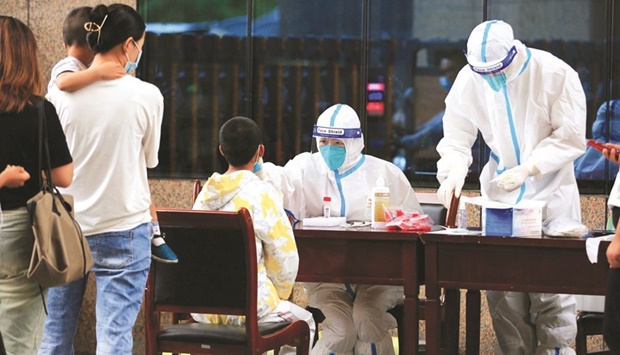China reported yesterday its highest number of coronavirus cases since May, with millions in lockdown this weekend as authorities persist with their zero-Covid policy.
Using snap lockdowns, long quarantines and mass testing, China is the last major economy still pursuing the goal of eliminating outbreaks, even as the strategy takes a heavy toll on the economy.
China reported 450 local coronavirus (Covid-19) infections yesterday, up from 432 a day earlier.
Most cases were asymptomatic.
The rising wave of cases led to fresh restrictions this week in some parts of the country.
Lanzhou, the capital of northwestern Gansu province, ordered its 4.4mn residents to stay home starting from Wednesday, and a county in Anhui province went into lockdown from Friday.
Beihai in the southern Guangxi region also announced lockdowns in parts of two districts that are home to more than 800,000 people.
“Currently, the epidemic prevention and control situation in Beihai city is severe and complicated, and the risk of hidden transmission in the community is relatively high,” said a government notice announcing the latest restrictions.
Earlier in the week, the steelmaking hub of Wugang in central Henan province announced a three-day lockdown over a single Covid-19 case.
The fast-spreading Omicron variant of the virus has been a major challenge for Chinese authorities, as they try to limit the economic damage caused by Covid-19 restrictions.
China logged its slowest second-quarter growth rate since the initial Covid-19 outbreak, with GDP expanding just 0.4% on-year.
Meanwhile, Macau’s government announced that a lockdown of businesses would be extended until Friday, according a statement on its website.
The lockdown in the Chinese special administrative region had been due to end tomorrow.
Macau imposed the shutdown last Monday, shuttering the city’s businesses and forbidding residents from leaving their apartments, except for essential activities such as grocery shopping.
Macau has recorded around 1,700 coronavirus infections since mid-June.
More than 20,000 people are in mandatory quarantine as the government adheres to China’s zero-Covid policy, which aims to stamp out all outbreaks, running counter to a global trend of trying to coexist with the virus.
More than 90% of Macau’s 600,000 residents are fully vaccinated against Covid-19 but this is the first time the city has had to grapple with the fast-spreading Omicron variant.
The former Portuguese colony has only one public hospital for its more than 600,000 residents, and its medical system was already stretched before the coronavirus outbreak.
Authorities have set up a makeshift hospital in a sports dome near the city’s Cotai strip and have around 600 medical workers from the mainland assisting them.
In neighbouring Hong Kong, authorities are starting to loosen draconian coronavirus restrictions even as daily cases top 3,000, in a push to reboot the financial hub and its economy.

A health worker taking a swab sample from a child to be tested for the coronavirus at a residential area in Zhangye, northwestern Gansu province.
